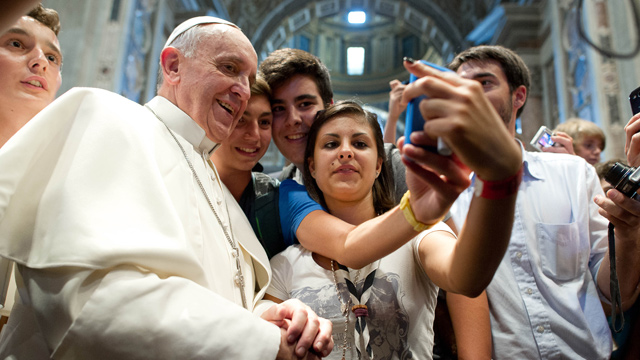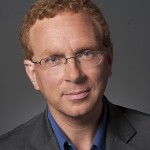This article originally appeared at The Nation.

In this photo provided by the Vatican newspaper L'Osservatore Romano, Pope Francis has his picture taken inside St. Peter's Basilica with youths from the Italian Diocese of Piacenza and Bobbio who came to Rome for a pilgrimage, at the Vatican, Aug. 28, 2013. The photo has since gone viral and is reported to be the first papal
Pope Francis says: “I have never been a right-winger…”
And the 266th and current pope of the Catholic Church went a good distance in confirming that sentiment in a remarkable interview with the Rev. Antonio Spadaro, the editor of the Italian Jesuit journal La Civilta Cattolica.
Asked about the church’s stance with regard to lesbians and gays, the pope replied:
In Buenos Aires I used to receive letters from homosexual persons who are “socially wounded” because they tell me that they feel like the church has always condemned them. But the church does not want to do this. During the return flight from Rio de Janeiro, I said that if a homosexual person is of good will and is in search of God, I am no one to judge. By saying this, I said what the catechism says. Religion has the right to express its opinion in the service of the people, but God in creation has set us free: it is not possible to interfere spiritually in the life of a person.
A person once asked me, in a provocative manner, if I approved of homosexuality. I replied with another question: “Tell me: when God looks at a gay person, does he endorse the existence of this person with love, or reject and condemn this person?” We must always consider the person.
But the pope, in the interview that has been published by the New York–based Jesuit journal America, went further, volunteering that
We cannot insist only on issues related to abortion, gay marriage and the use of contraceptive methods. This is not possible. I have not spoken much about these things, and I was reprimanded for that. But when we speak about these issues, we have to talk about them in a context. The teaching of the church, for that matter, is clear and I am a son of the church, but it is not necessary to talk about these issues all the time.
The dogmatic and moral teachings of the church are not all equivalent. The church’s pastoral ministry cannot be obsessed with the transmission of a disjointed multitude of doctrines to be imposed insistently.
As Marianne Duddy-Burke, executive director of Dignity, a group that advocates for gay, lesbian, bisexual and transgender Catholics, says, the pope’s words “signaled an entirely new direction for the Catholic Church.”
“To me, it is a clear directive to the bishops of the church to end their antigay campaigns,” says Duddy-Burke. “He is essentially saying, ‘Go back to being pastors, stop being rule-enforcers.’”
Whether that aspiration will become reality, especially in the United States, remains to be seen. But, in the interview, the pope bluntly declared, “We have to find a new balance; otherwise even the moral edifice of the church is likely to fall like a house of cards, losing the freshness and fragrance of the Gospel.”
That new balance could have significant consequences for American political debates.
During the 2010 debate over health-care reform, the balancing act was a difficult one. The U.S. Conference of Catholic Bishops opposed passage of the Affordable Care Act because of its language on abortion, and created significant pressure on Catholic Democrats to do the same. But its message was countered by a letter from Sister Carol Keehan, president and CEO of the Catholic Health Association, which strongly supported the legislation. Then Network, the Catholic social justice lobby, released a letter signed by leaders of communities and organizations representing tens of thousands of nuns. The letter announced:
The health care bill that has been passed by the Senate and that will be voted on by the House will expand coverage to over 30 million uninsured Americans. While it is an imperfect measure, it is a crucial next step in realizing health care for all. It will invest in preventative care. It will bar insurers from denying coverage based on pre-existing conditions. It will make crucial investments in community health centers that largely serve poor women and children. And despite false claims to the contrary, the Senate bill will not provide taxpayer funding for elective abortions. It will uphold longstanding conscience protections and it will make historic new investments — $250 million — in support of pregnant women. This is the REAL pro-life stance, and we as Catholics are all for it.
Network and other Catholic social justice groups have argued, often in the face of significant criticism, that the church must strike a better balance that highlights advocacy on poverty and economic injustice issues.
Network’s ongoing “Nuns on the Bus” tour directly challenged one of the most prominent Catholics in American politics: Wisconsin Congressman Paul Ryan, who was Republican nominee for vice president in 2012.
At the Democratic National Convention last year, Network executive director Sister Simone Campbell, fresh from a high-profile “Nuns on the Bus” tour that visited Ryan’s district, declared that the House Budget Committee chairman’s budget proposal “failed a basic moral test, because it would harm families living in poverty.”
To thunderous applause from delegates, many Catholics who had tears in their eyes, Sister Simone affirmed that “Mitt Romney and Paul Ryan are correct when they say that each individual should be responsible. But their budget goes astray in not acknowledging that we are responsible not only for ourselves and our immediate families. Rather, our faith strongly affirms that we are all responsible for one another. I am my sister’s keeper. I am my brother’s keeper.”
Sister Simone’s speech recalled the “seamless garment” stance advanced by progressive Catholics such as Joseph Cardinal Bernardin, who in the 1980s and 1990s argued that to be “pro-life,” one must be opposed to unjust wars and capital punishment and strongly supportive of social welfare programs.
Recalling the story of a woman named Margaret, who died because she lacked adequate health insurance, Sister Simone told the Democratic convention, “The Affordable Care Act will cover people like Margaret. We all share responsibility to ensure that this vital healthcare reform law is properly implemented and that all governors expand Medicaid coverage so no more Margarets die from lack of care. This is part of my pro-life stance and the right thing to do.”
Sister Simone was arguing for balance there. It was a controversial act, and she was criticized by prominent Catholics. As recently as this year, the Congregation for the Doctrine of Faith, the Catholic church’s doctrinal watchdog, reprimanded the Leadership Conference of Women Religious in the United States, mentioning “serious doctrinal problems.” The doctrinal wrangling is far from finished, and it still too early to make assumptions about how much the church will change under this pope.
Yet, now, the most prominent of all Catholics is suggesting that the church “cannot insist only on issues related to abortion, gay marriage and the use of contraceptive methods.”
The pope’s call for a “new balance” will itself be controversial. But it suggests an opening for the message that Sister Simone and others have — for many years now — been advancing about the importance of dialing up the church’s moral advocacy on behalf of peace and economic justice.


